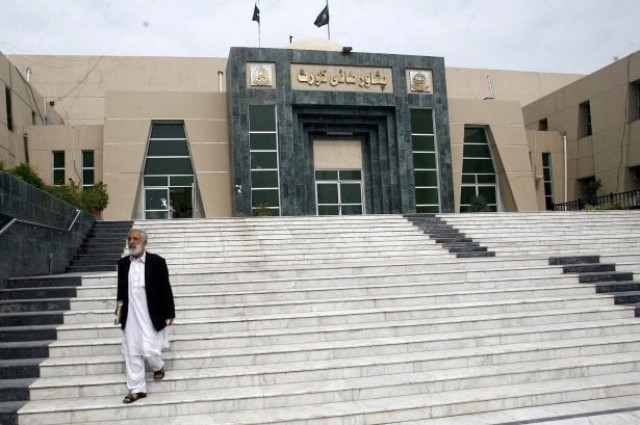From litigants to lawyers: Relocation of courts an unhappy notion
Villagers from Takht-e-Nusrati will have to travel long distances to reach new judicial complex.

Senior lawyer and former president of the Takht-e-Nusrati Bar Association Zafar Jamal said lawyers will protest if the courts are relocated.. PHOTO: PPI
Ayaz, 30, who is fighting a case and has to appear at the court frequently for hearings, is greatly perturbed about the government’s decision to shift all lower courts to the Karak Judicial Complex which is being built further away on the Indus Highway. Work on the complex was inaugurated in October last year by the chief justice of Peshawar High Court.
Road to justice
For hundreds of residents of Kohe Maidan and Mona areas of Takht-e-Nusrati tehsil, the journey to the town centre is long and tiresome. There are no paved roads in these areas, forcing residents to walk for an hour or more to a main road from where they can hitch a ride to courts and government offices.

The shifting of all courts to the judicial complex will make the journey even longer for locals. “I am facing a murder trial; you can only imagine how many threats a person like me gets,” Ayaz told The Express Tribune, requesting the government to address the concerns of residents.
On the day of a court hearing, Ayaz’s journey begins before sunrise. He walks for at least two hours on a mountainous path before he is able to get a bus which takes the same number of hours to take him to his destination. According to Ayaz, residents of Khorha have to walk for four hours to get to a bus stand.
“After the courts shift to the judicial complex, the journey will become even longer. I would need to spend a night with friends or relatives in Takht-e-Nusrati to be able to make it to the hearing on time the next morning,” said Ayaz. He added it is already difficult to convince witnesses to go and record statements at the court; getting them to go the distance to the judicial complex will be even harder.
Shanawa Godi Khel resident Ghani Rehman who is fighting his wife’s transfer has the same concerns. “We have always been ignored when development plans are made, now the relocation of courts will just increase problems for us,” said Rehman, who will have to cover 50 kilometres to reach the judicial complex.
Unwelcome decision
Takht-e-Nusrati’s legal fraternity has also expressed reservations over the move.
“The judiciary aims to provide justice to people at their doorstep but the shifting of Takht-e-Nusrati courts is a contradiction of ‘access to justice’,” said Muslim Jan, a senior lawyer.
Jan appreciated the construction of a judicial complex equipped with modern facilities but he said he was against the decision to shift all courts to the complex because that would increase travel times for applicants. “We have requested the honourable PHC chief justice to consider our concerns,” said Jan.
Senior lawyer and former president of the Takht-e-Nusrati Bar Association Zafar Jamal said lawyers will protest if the courts are relocated. “People are poor; they cannot afford to travel all the way to the complex to get affidavits or bail for small offences,” he said.
According to Advocate Malik Farid Azam, the present court building is easily accessible from a lot of villages of the tehsil. He said the area’s elders have jointly signed an application requesting the courts not be shifted. The application has been sent to the relevant authorities. Azam also warned of a protest if the courts are relocated.
Published in The Express Tribune, January 7th, 2014.













COMMENTS
Comments are moderated and generally will be posted if they are on-topic and not abusive.
For more information, please see our Comments FAQ